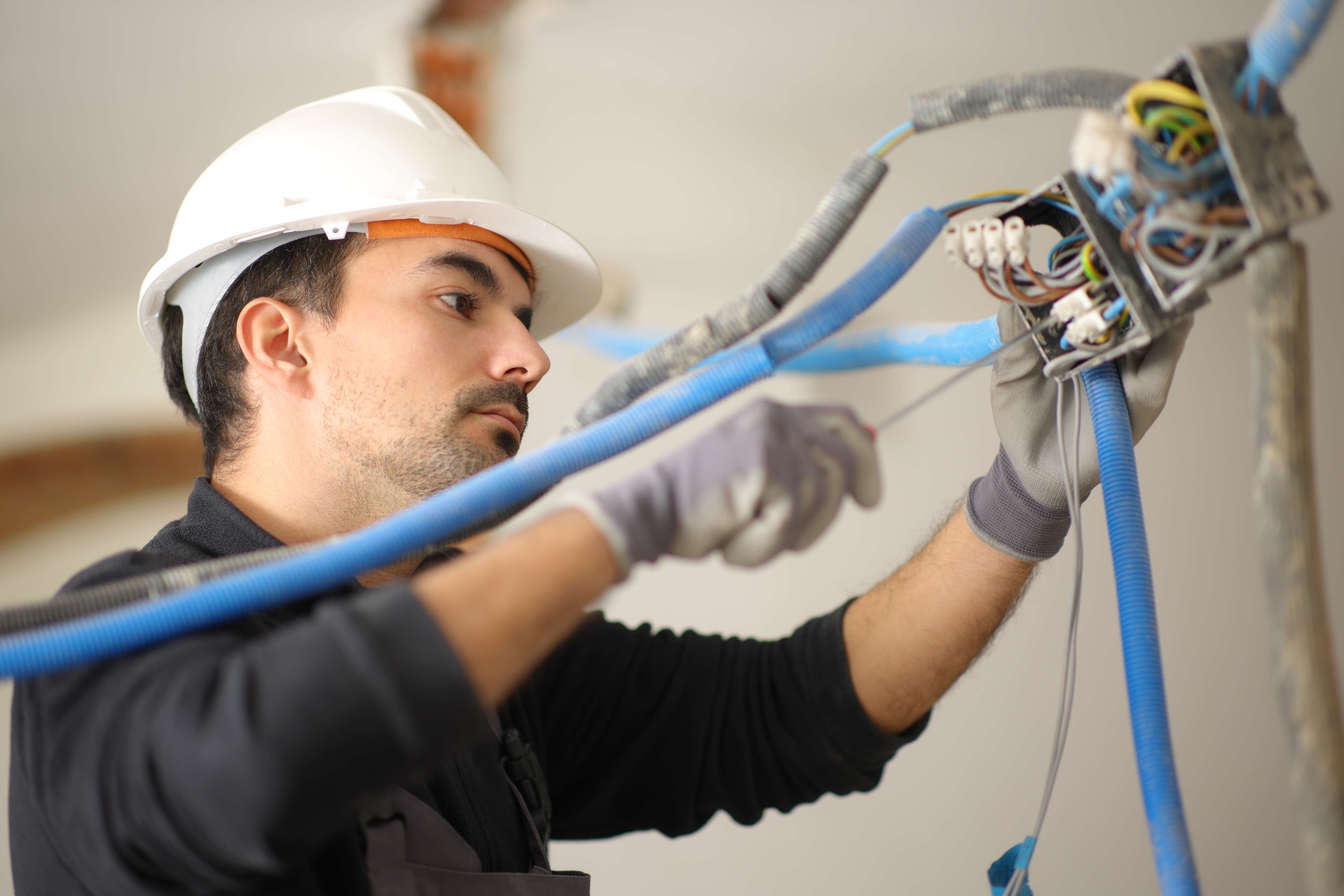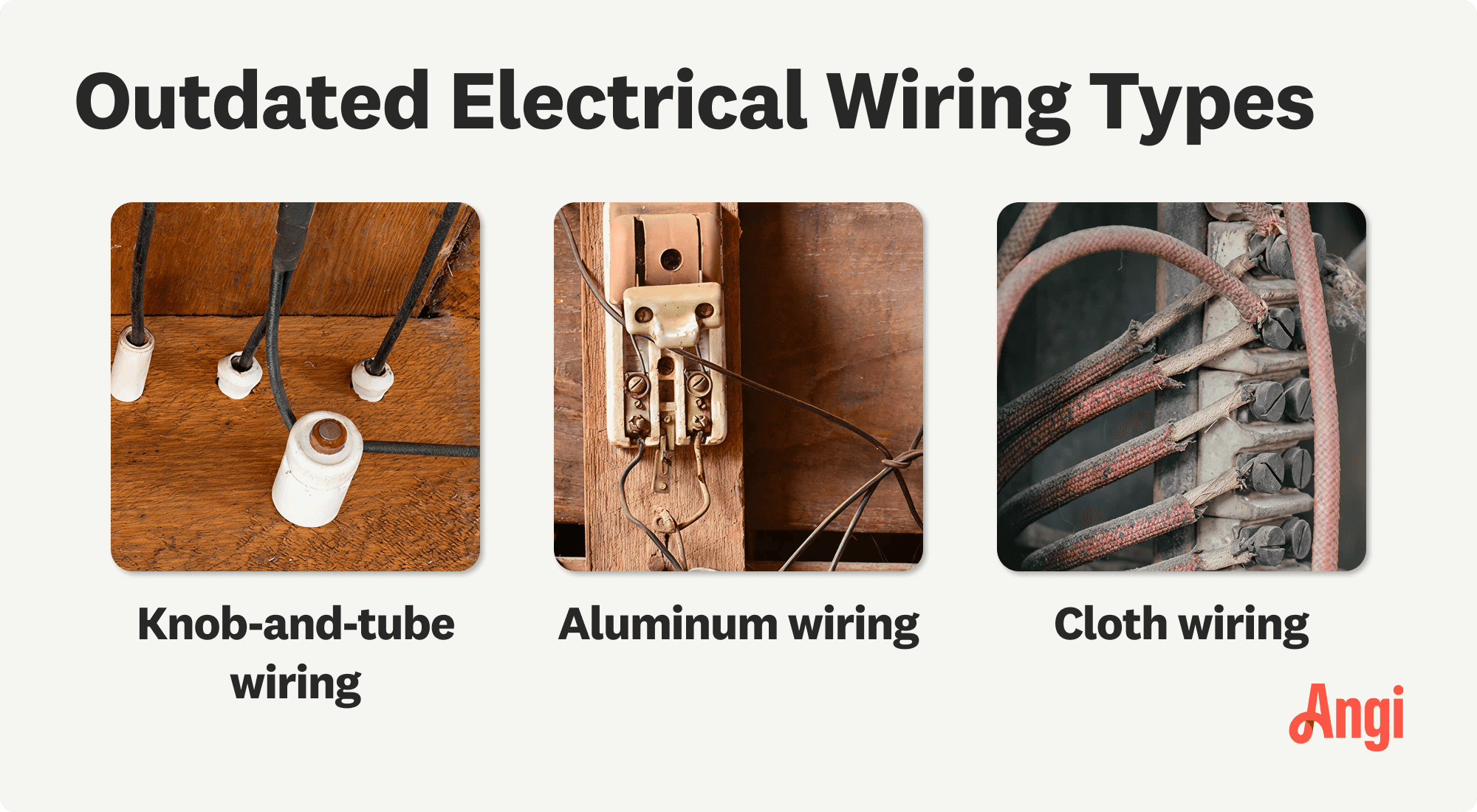
Old or worn electrical wires can interrupt the electrical supply to your home. Find out the cost to replace the wire from the meter to the breaker box.
Rewiring a house in Philadelphia costs $1,640 on average, with most homeowners paying between $610 and $2,710. Final costs depend on your home’s layout, wiring condition, and permit requirements.


Electricians charge $2 to $4 per square foot for rewiring labor and materials, with total costs increasing for larger or older homes.
Philadelphia electricians must be licensed and insured, and homeowners should account for local permit rules and an 8% sales tax on materials.
Upgrading outdated wiring can boost home value in Philly’s historic housing market, especially when replacing knob-and-tube systems.
Rewiring a house in Philadelphia costs an average of $1,640, with most homeowners spending between $610 and $2,710. Minor electrical updates in newer homes may fall on the lower end, while full rewiring in older homes with outdated or unsafe wiring can exceed $3,000. Costs are influenced by factors like wall type, wiring access, local permit requirements, and whether you're upgrading your panel. Here’s what you can expect to pay for a rewiring project in the Philly area.
Several factors influence the total cost to rewire a house in Philadelphia, such as the home's square footage, the difficulty of accessing the existing wiring, and whether upgrades like a new service panel are required. If you think it’s the right time to upgrade your home electrical wiring, consider these factors to plan a budget for this project.
In Philadelphia, home rewiring costs are based on square footage, with most homeowners paying between $2 and $4 per square foot for both labor and materials.
| House Size in Square Feet | Average Cost |
|---|---|
| 1,000 | $2,000–$4,000 |
| 1,500 | $3,000–$6,000 |
| 2,000 | $4,000–$8,000 |
| 2,500 | $5,000–$10,000 |
| 3,000 | $6,000–$12,000 |
Material selection plays a major role in determining how much you’ll spend on a rewiring project. Basic electrical components, such as wire, switches, and outlets, make up a large portion of the budget, while specialty items like fire-rated cable or home automation systems can increase costs.
| Wire Type | Cost per Linear Foot | Description |
|---|---|---|
| NM Cable | $0.40–$0.80 | Features a hot, neutral, and ground wire enclosed in a durable plastic jacket |
| UF Cable | $0.50–$0.75 | A weather-resistant version of NM cable, suited for underground or wet locations |
| THHN/THWN Wire | $0.80–$1.60 | Common in exposed installs or unfinished spaces like garages or near water heaters |
| Coaxial Cable | $0.25–$0.35 | Mostly used for connecting TVs or video devices, though less common in rewiring projects |
| Low-Voltage Wire | $0.25–$0.35 | Runs on low energy, typically for systems like doorbells, security, or thermostats |
A contractor may add up to $500 for cleanup after the job is completed. While they’ll prep their own materials and tools, homeowners are expected to take care of moving personal belongings, clearing access to walls, and securing valuables before work begins.
In Philadelphia, hiring a licensed electrician means navigating city permitting rules, union labor rates, and local electrical codes that may affect the final price. From service fees and equipment taxes to warranty options, here’s what to expect when rewiring your home in the Philly metro area.
Electricians working in Philadelphia must hold a current license issued by the city’s Department of Licenses and Inspections. The city also enforces strict permitting requirements for electrical work, including service panel upgrades and rewiring projects. Licensed contractors are also required to carry liability insurance, so be sure to request verification of credentials before you hire.
Local electricians in Philadelphia charge between $50 and $100 per hour for labor. In Philadelphia, materials used (like wiring, outlets, panels) are subject to an 8% combined sales tax (6% state plus 2% county) while labor for repairs and installation is generally exempt. So you’ll pay tax only on parts and equipment, not on the hourly service.
While it’s not customary to tip electricians in Philadelphia, offering around 5% to 10% for exceptional service is always appreciated. If you’d rather not tip, consider helping them grow their business with a positive online review or word-of-mouth referral.
Standard warranties from electricians range from 1 to 5 years and include protection against installation issues or faulty materials. Extended warranty plans may also be available for an additional fee, so be sure to ask for details and weigh the coverage against the cost before committing.

In Philadelphia, a city known for its historical homes, rewiring can significantly enhance home value and buyer appeal, especially if you’re investing in the cost of replacing knob and tube wiring or other outdated components. Older electrical systems can be a major concern for buyers and a potential dealbreaker during inspections.
Upgrading your wiring improves safety, brings the home up to current code, and allows for modern conveniences like smart thermostats, home offices, and EV chargers. In a city where historical charm meets functionality, a professionally rewired home helps ease buyer concerns and demands a higher resale value in today’s competitive market.
Home is the most important place on earth, which is why Angi has helped more than 150 million homeowners transform their houses into homes they adore. To help homeowners with their next project, Angi provides readers with the most accurate cost data and upholds strict editorial standards. We survey real Angi customers about their project costs to develop the pricing data you see, so you can make the best decisions for you and your home. We pair this data with research from reputable sources, including the U.S. Bureau of Labor Statistics, academic journals, market studies, and interviews with industry experts—all to ensure our prices reflect real-world projects.
Want to help us improve our cost data? Send us a recent project quote to [email protected]. Quotes and personal information will not be shared publicly.
From average costs to expert advice, get all the answers you need to get your job done.

Old or worn electrical wires can interrupt the electrical supply to your home. Find out the cost to replace the wire from the meter to the breaker box.

The average cost to replace an electrical mast is around $750, depending on the size and extent of the replacement. Read on to budget for a meter riser.

Before you hire a licensed electrical contractor, you should learn the cost to run electric from the road to your house so you can budget for the project.

If your light switch won’t turn off, try these troubleshooting tips to identify the problem before contacting a local electrician.

Is your home costing you more money than it should be? You can take steps to save money throughout your home to keep it where it should be—your wallet.

Your home might have a variety of electrical outlets, depending on how old the structure is and what type of appliances you use. Learn the different types of outlets, how they work, and how you use them.